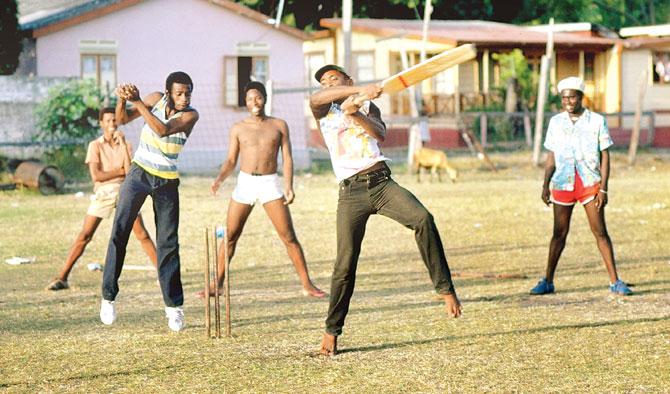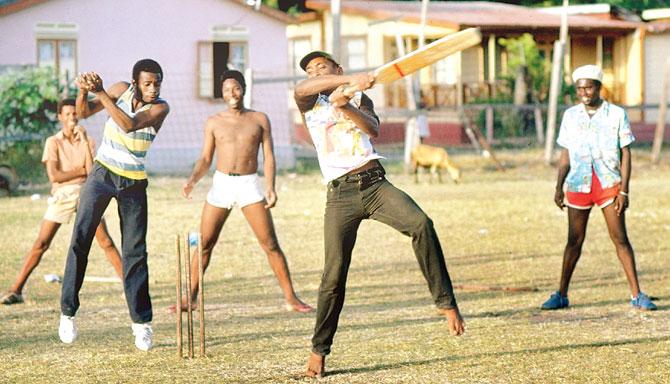The fascinating part of books by Windies are chapters about their childhood. Reading the same on Best and Gayle will be no different

Greatness taking shape: A group of West Indian youngsters playing a game of cricket in Barbados
 It is not often that two West Indian cricketers get their autobiographies published in the same year, but this year will see the release of books — Six Machine by Chris Gayle and Mind the Windows by Tino Best — both colourful characters, who will have plenty to say about West Indies cricket administration and about themselves.
It is not often that two West Indian cricketers get their autobiographies published in the same year, but this year will see the release of books — Six Machine by Chris Gayle and Mind the Windows by Tino Best — both colourful characters, who will have plenty to say about West Indies cricket administration and about themselves.
Gayle's content is unknown, but Best's book is a potential bestseller, going by recently released pre-publication excerpts that said he bedded 500-650 women in his playing career. To be fair to Best, he did say in an interview that his sexploits were only a small part of the book and there is also stuff about a young lad growing up in Barbados, dreaming of playing for the West Indies, realising that dream, and going on to bowl in front of a packed Wankhede Stadium to Sachin Tendulkar in his farewell Test in 2013.
ADVERTISEMENT
As someone who doesn't like missing out on reading books written by West Indians, I can vouch that the most fascinating parts of those books are the early chapters, which deal with their childhood struggles and joys en route to the world stage. To read the same about Best and Gayle will be no different.

Greatness taking shape: A group of West Indian youngsters playing a game of cricket in Barbados. File pic/Getty Images
Alvin Kallicharran has not yet written his autobiography but there is a video of him on YouTube where he talks about how, as a poor boy, he travelled to Georgetown, Guyana, to play his debut first-class game as a teenager in the 1960s. The journey entailed a bus ride from his village, a boat to get to the other side and then train travel on an empty stomach that craved for a snack even more when he watched a fellow passenger tuck into her breakfast.
Kallicharran's fellow Guyanese, Rohan Kanhai too had to travel far for his entry into first-class cricket. In Blasting for Runs, he wrote: "What a journey that was — 15 miles by bus to New Amsterdam, across the ferry, then a long, hot train ride into Georgetown, all the time clutching my old tattered cricket bag and trying to look outwardly calm. I had never seen a first-class match before, let alone played in one."
If you wonder how Clive Lloyd got to be being bespectacled, you'll find it in his book Living for Cricket. In 1956, at the age of 12, Lloyd played mediator in a "furious fight" between two of his schoolmates. While trying to separate them, Lloyd took a knock on his right eye with a ruler. Pain led to a loss in vision and a lot of early dismissals caused by not being able to sight the ball at club games.
Lloyd wrote: "So it was off to the optician. First, drops were recommended, but when they proved ineffective, spectacles were ordered, becoming — for better or for worse — part of the Lloyd physique for ever more." Lloyd lost his father when he was just 16. He said goodbye to academics and found a job in the administration section of the Georgetown Hospital at a starting salary of $78, which helped him look after his mother and four sisters with a younger brother in England.
Gordon Greenidge, who served Lloyd well on West Indies' ladder of world dominance, was looked after by his grandmother in Black Bess village of Barbados because his mother moved to England where she married a man who the hard-hitting batsman later called his father. Until then, his name was Cuthbert Gordon Lavine.
He was happy playing cricket with his uncles in Barbados before being summoned to England by his mother, who lived in Reading. At school, Greenidge was racially abused. He wrote in Man in the Middle: "Many times I felt obliged to exact revenge for the terrible things they called me and it was not unusual for me to limp home with nose and lips bleeding. I was lonely, bewildered and overwhelmed by the sheer size of everything. With no older brother and no friends to turn to, my suffering was all the worse."
Garfield Sobers, the greatest all-round cricketer to walk the turf, too endured hard times. His father, Shamont was a seaman with the Canadian Merchant Navy. Sobers Sr died when the Germans sank his ship in 1942, when little Garfield was just five, leaving his mother Thelma to look after six children.
Only after his father's death did Sobers start to play freely with kids from the neighbourhood; something that Shamont took exception to. Giant fast bowler Joel Garner faced resistance to a larger extent. His parents migrated to Canada and USA, leaving Garner and their younger son Adrian to be looked after by their grandparents.
Garner's grandmother didn't want him to spend his days playing cricket with his friends. "Gran was small in stature; but she wielded a mean whip," wrote Garner in Big Bird Flying High.
Despite all these obstacles, West Indies produced some of the finest exponents of batting and bowling. It's shattering to think about the amount of talent that didn't make it. Let's hope Gayle's book is inspirational. As for the steamy bits in Best's book, a 'don't-do-this-and-play-cricket' warning from the author himself would do no harm.
mid-day's group sports editor Clayton Murzello is a purist with an open stance. He tweets @ClaytonMurzello
 Subscribe today by clicking the link and stay updated with the latest news!" Click here!
Subscribe today by clicking the link and stay updated with the latest news!" Click here!







